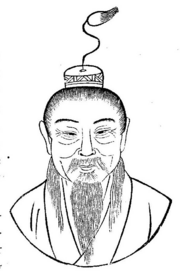Liu Xiang (scholar) facts for kids
Quick facts for kids Liu Xiang |
|
|---|---|
 |
|
| Born | Liu Gengsheng 77 BCE Xuzhou, Han dynasty |
| Died | 6 BCE (aged 71) |
| Issue | Liu Xin |
| Father | Liu De, Marquis Miao of Yangcheng |
| Religion | Confucianism |
| Occupation | Astronomer, historian, librarian, poet, politician, writer |
| Liu Xiang | |||||||||||||||||||||||||||||||||
|---|---|---|---|---|---|---|---|---|---|---|---|---|---|---|---|---|---|---|---|---|---|---|---|---|---|---|---|---|---|---|---|---|---|
| Traditional Chinese | 劉向 | ||||||||||||||||||||||||||||||||
| Simplified Chinese | 刘向 | ||||||||||||||||||||||||||||||||
|
|||||||||||||||||||||||||||||||||
| Liu Gengsheng | |||||||||||||||||||||||||||||||||
| Traditional Chinese | 劉更生 | ||||||||||||||||||||||||||||||||
| Simplified Chinese | 刘更生 | ||||||||||||||||||||||||||||||||
|
|||||||||||||||||||||||||||||||||
| Courtesy Name | |||||||||||||||||||||||||||||||||
| Chinese | 子政 | ||||||||||||||||||||||||||||||||
|
|||||||||||||||||||||||||||||||||
Liu Xiang (born Liu Gengsheng, 77–6 BCE) was a very smart person from ancient China. He was an astronomer, historian, librarian, poet, politician, and writer during the Western Han dynasty. He knew a lot about many different subjects, like history, books, and stars. Liu Xiang is especially famous for his amazing work organizing the huge imperial library.
Contents
Who Was Liu Xiang?
Early Life and Family
Liu Gengsheng was born in a place called Xuzhou. He was part of the Liu family, which was the ruling family of the Han dynasty. This meant he was a distant relative of Liu Bang, who started the Han dynasty. Liu Xiang's father was a high-ranking official called a marquess. Liu Xiang's son, Liu Xin, also became a famous scholar, following in his father's footsteps.
Challenges and Comeback
When Emperor Yuan was ruling, Liu Xiang was one of the officials who followed the teachings of Confucianism. They wanted to limit the power of the emperor's relatives by marriage, especially the Shi and Xu families. Liu Xiang ended up on the losing side of a power struggle with some powerful officials. Because of this, he was put in prison for a short time and lost his official job. He didn't get a new job for about fifteen years.
Later, when Emperor Cheng became emperor, things changed in the government. Liu Xiang was able to get back into government work. In 26 BCE, the emperor asked Liu Xiang to work on a huge project. For more than 20 years, Liu Xiang spent his time organizing the emperor's massive collection of books. His son, Liu Xin, helped him with this important work and finished it after Liu Xiang passed away.
His Amazing Books and Writings
Liu Xiang created the first official list of books in the imperial library. This list was called the Abstracts (Bielu). He was also the first known editor of a famous book called the Classic of Mountains and Seas (Shanhaijing), which his son later completed.
Liu Xiang also put together collections of stories and biographies. Some of these include the Strategies of the Warring States (Zhanguoce), the New Prefaces (Xinxu), the Garden of Stories (Shuoyuan), and the Biographies of Exemplary Women (Lienüzhuan). For a long time, people mistakenly thought he also put together the Biographies of the Immortals (Liexian Zhuan), which is a collection of stories and songs about special people.
Liu Xiang was also a poet. He wrote a collection of poems called the "Nine Laments" ("Jiu Tan"), which can be found in the Songs of Chu.
See also
- Confucian classics
- Guodian Chu Slips
- Liu An
- Science and technology of the Han dynasty
- Sima Qian
- Sima Tan
Images for kids
 | Georgia Louise Harris Brown |
 | Julian Abele |
 | Norma Merrick Sklarek |
 | William Sidney Pittman |


